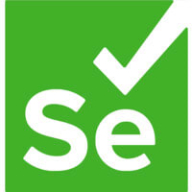

Visual Studio Test Professional and Selenium HQ are two prominent competitors in the software testing tools category, each offering significant advantages. Based on the comparison, Selenium HQ holds the upper hand with its cost-efficiency and flexibility due to its open-source nature.
Features: Visual Studio Test Professional offers integration capabilities with TFS and MTM, supports C# and .NET projects, and provides a user-friendly interface, making it suitable for Microsoft product users. Selenium HQ supports a range of scripting languages, offers cross-browser compatibility, and excels in scalability, making it ideal for diverse testing environments.
Room for Improvement: Visual Studio Test Professional could improve its integration with Visual Studio, reduce pricing, and enhance stability and documentation. Additionally, better dashboards and manual testing features are requested. Selenium HQ needs improvements in handling AJAX controls, mobile testing support, and documentation and reporting. Integration capabilities with non-web applications and broader support could enhance usability.
Ease of Deployment and Customer Service: Visual Studio Test Professional caters primarily to on-premises deployments but also supports cloud options. Documentation is clear, but technical support varies. Selenium HQ supports flexible deployment across on-premises, cloud, and hybrid environments. It relies on community support due to the lack of direct vendor assistance.
Pricing and ROI: Visual Studio Test Professional incurs significant costs with yearly licensing fees, although it provides a free community edition. It ensures good ROI through comprehensive IDE and development tools that increase productivity. Selenium HQ, being open-source, has no licensing fees and offers excellent cost efficiency and flexibility. Businesses only incur costs related to implementation and supporting infrastructure.
The marketplace community and forums are what we browse and look after, and we have found solutions whenever we tried to find anything.
I have not had the need to escalate questions to Selenium HQ tech support recently, as open community support is widely available and has been sufficient for our needs.
Sometimes, the documentation is not readable, being too long or too detailed and not connected to my problem.
We can execute thousands of test cases weekly, and our automation coverage using Selenium HQ is approximately eighty-five percent.
Selenium HQ is a scalable solution; it has been in production for the last two years, but I have been working on it for the last six years, so it is definitely scalable.
An automatic update mechanism for Selenium HQ would be beneficial, eliminating the need for manual downloads and updates of browser drivers when new versions are released.
I don't know if we have that capability to provide different data sources such as SQL Server, CSV, or maybe some other databases, so that kind of capability would be great.
Additionally, in Visual Studio Code, we have an agent mode for GitHub Copilot, which is very helpful in testing or development phases, while Visual Studio's GitHub Copilot is a bit tricky and sometimes does not provide my desired output.
The product needs contextual help integrated within its interface.
Sometimes, the library version is not compatible with other libraries, causing errors in my application.
The price is expensive.
Selenium HQ supports multiple browsers via grid hosting and offers dynamic configuration setup for testing across Chrome, Edge, and Internet Explorer.
When we were doing these tests manually, it took several hours of effort, and those hours, when counted on the basis of person days, used to be maybe six or seven months of effort, which we can now do every day by running the pipeline.
It supports cross-platform functionality.
Visual Studio Test Professional is highly valuable because it provides extensive extensions and plugins that assist in measuring code quality.
We have a retrospective in our auto projects that we are using frequently to get lessons learned, what went well, and what is going wrong.
| Product | Market Share (%) |
|---|---|
| Selenium HQ | 3.2% |
| Visual Studio Test Professional | 1.2% |
| Other | 95.6% |


| Company Size | Count |
|---|---|
| Small Business | 41 |
| Midsize Enterprise | 33 |
| Large Enterprise | 51 |
| Company Size | Count |
|---|---|
| Small Business | 15 |
| Midsize Enterprise | 14 |
| Large Enterprise | 24 |
Selenium HQ is an umbrella project that includes a number of tools and frameworks that allow for web browser automation. In particular, Selenium offers a framework for the W3C WebDriver specification, a platform- and language-neutral coding interface that works with all of the main web browsers.
Selenium is a toolset for automating web browsers that uses the best methods available to remotely control browser instances and simulate a user's interaction with the browser. It enables users to mimic typical end-user actions, such as typing text into forms, choosing options from drop-down menus, checking boxes, and clicking links in documents. Additionally, it offers a wide range of other controls, including mouse movement, arbitrary JavaScript execution, and much more.
Although Selenium HQ is generally used for front-end website testing, it is also a browser user agent library. The interfaces are universal in their use, which enables composition with other libraries to serve your purpose.
The source code for Selenium is accessible under the Apache 2.0 license. The project is made possible by volunteers who have kindly committed hundreds of hours to the development and maintenance of the code.
Selenium HQ Tools
These three main Selenium HQ tools have powerful capabilities:
Reviews from Real Users
Selenium HQ stands out among its competitors for a number of reasons. Two major ones are its driver interface and its speed. PeerSpot users take note of the advantages of these features in their reviews:
Avijit B., an automation tester at a tech services company, writes of the solution, “The driver interface is really useful. When we implement the Selenium driver interface, we can easily navigate through all of the pages and sections of an app, including performing things like clicking, putting through SendKeys, scrolling down, tagging, and all the other actions we need to test for in an application.”
Another PeerSpot reviewer, a software engineer at a financial services firm, notes, “Selenium is the fastest tool compared to other competitors. It can run on any language, like Java, Python, C++, and .NET. So we can test any application on Selenium, whether it's mobile or desktop."
We monitor all Functional Testing Tools reviews to prevent fraudulent reviews and keep review quality high. We do not post reviews by company employees or direct competitors. We validate each review for authenticity via cross-reference with LinkedIn, and personal follow-up with the reviewer when necessary.